Rear Adm. Peter Kofi Faidoo of Ghana
Sees Collaboration, Technology and Training as Keys to a Safer Gulf of Guinea
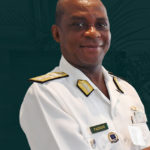 Rear Adm. Faidoo is Ghana’s chief of naval staff. Before his appointment in 2016, he held a number of posts, including director of Naval Operations and National Maritime Security coordinator. In 2012, he was appointed director general of training at the General Headquarters, and, in 2015, he became flag officer commanding the Western Naval Command. In 1998, as commanding officer of the GNS Sebo, he took part in the Naval Task Force of the Economic Community of West African States Monitoring Group, and his vessel helped stop a rebel invasion of Freetown Harbour in Sierra Leone. For his actions he was awarded a medal for leadership and given honorary citizenship of Sierra Leone. He spoke to ADF from Accra. This interview has been edited to fit this format.
Rear Adm. Faidoo is Ghana’s chief of naval staff. Before his appointment in 2016, he held a number of posts, including director of Naval Operations and National Maritime Security coordinator. In 2012, he was appointed director general of training at the General Headquarters, and, in 2015, he became flag officer commanding the Western Naval Command. In 1998, as commanding officer of the GNS Sebo, he took part in the Naval Task Force of the Economic Community of West African States Monitoring Group, and his vessel helped stop a rebel invasion of Freetown Harbour in Sierra Leone. For his actions he was awarded a medal for leadership and given honorary citizenship of Sierra Leone. He spoke to ADF from Accra. This interview has been edited to fit this format.
ADF: Illegal, unreported and unregulated (IUU) fishing is a major problem in West Africa. According to one study, about 40 percent of the fish caught in the waters off the coast of West Africa are taken illegally. What is Ghana doing to address this issue?
Rear Adm. Faidoo: The fisheries sector in Ghana and its resources have long been a pillar of the national economy. It generates over $1 billion in revenue each year and accounts for at least 4.5 percent of Ghana’s gross domestic product. The sector also provides the livelihood to an estimated 2.4 million people. There is a lot of IUU fishing in our waters, and not only here but in the whole Gulf of Guinea. This has been going on for a very long time. Ghana has adopted the United Nations Convention on the Law of the Sea, so we have signed up for 200 nautical miles of exclusive economic zone (EEZ). So, in Ghana for instance, we have over 64,000 square nautical miles, and that is a huge area compared to the land area of Ghana. We are, more or less, a Third World country. We do not have sufficient assets and resources to patrol the whole area and keep platform ships at sea. Still, we in Ghana are doing better than some of our neighboring countries because we have better resources. The fact remains that there are parts of the sea that are not regularly patrolled. It is true that the region loses about $2.3 billion annually through this IUU fishing.
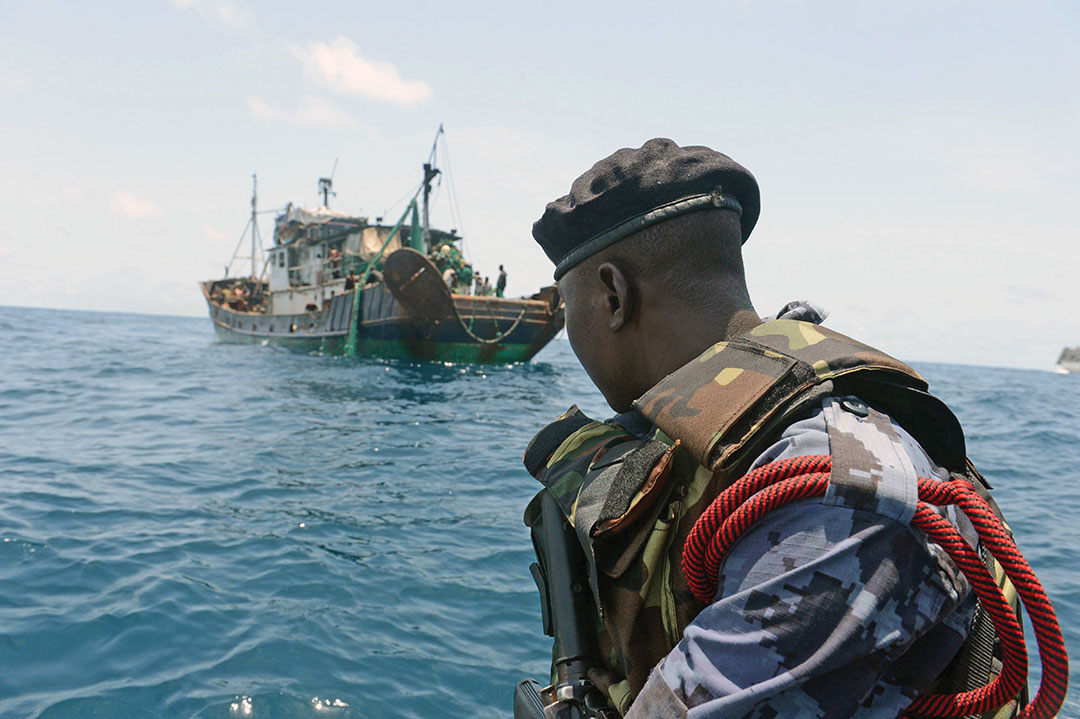
What we do is we collaborate with other agencies in what is called the Fisheries Enforcement Unit (FEU). This is made up of personnel drawn from the Ghana Navy, Ghana Marine Police, Fisheries Commission and the Attorney General’s department. The FEU conducts sea and land patrols to enforce the provisions in the Fisheries Act and Regulations. Among the tasks of the unit are enforcing a closed fishing season, reviewing regulations, capacity building and staffing an observer program aboard all industrial fishing vessels registered in Ghana.
ADF: How is technology helping you fight illegal fishing?
Rear Adm. Faidoo: This is an area where we’ve made great progress. The importance of technology in combating illegal fishing cannot be overemphasized. All Ghanaian registered industrial fishing vessels must carry a vessel monitoring system as well as automatic identification system (AIS) transponders. This has enabled vessels to be tracked and monitored continuously from the Monitoring Control and Surveillance Center and the Navy’s Maritime Operations Centers throughout the country. Additionally, all tuna vessels have an electronic monitoring system installed. This is a video system that records fishing activities on board. The video can then be downloaded and replayed. The technologies have gone a long way to ensure that vessels and the masters comply and follow responsible fishing practices.
We also have a partnership with the U.S. and AFRICOM (U.S. Africa Command). They have provided for us equipment to observe our sea from our maritime operations center. We have done this through the use of equipment such as TimeZero monitoring and AIS monitoring so that we can observe what goes on in our waters and, when necessary, go out there to prosecute illegal fishing.
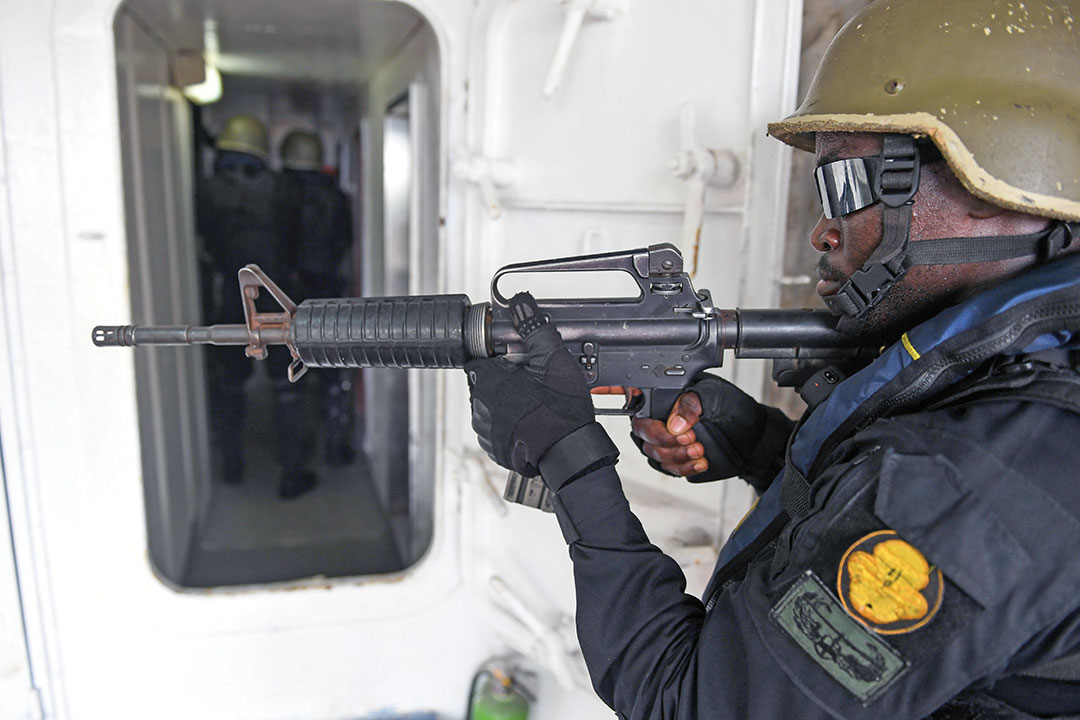
PETTY OFFICER 1ST CLASS THERON J. GODBOLD/U.S. NAVY
ADF: How are you partnering with other countries in the Gulf of Guinea and beyond to share information about vessels fishing in your waters illegally?
Rear Adm. Faidoo: Again, I have to take the chance to thank the U.S. government acting through the U.S. Navy. We in Ghana have very good relations with the countries in the Gulf of Guinea, particularly Côte d’Ivoire to our west and Togo to our east. Joint exercises such as Obangame Express help us to improve interoperability and engender trust amongst us. Indeed, even at the height of our maritime disputes with Côte d’Ivoire, we continued to provide ships for them as target ships in Obangame, and our maritime operations centers are constantly in touch. They are able to coordinate cross-border maritime security issues. Indeed, just last week a ship left Togolese anchorage without paying the necessary fees and sailed into Ghanaian waters. The Togolese authorities alerted us, and we immediately sailed a ship to accost them. The ship was detained in Ghana until it fulfilled the obligations with the Togolese authorities. With Nigeria, we have a special relationship in terms of training in each other’s institutions. For two years running I personally have attended regional maritime symposia in Nigeria, and we also send ships to participate in international maritime exercises. So we do collaborate with our neighbors; we try to share resources, since many of the navies don’t have the capacity to control or have a permanent presence at sea.
ADF: In early 2018, there were five pirate attacks recorded in Ghana’s waters. This was unusual in what is typically a safe area, and some fishing vessels in the tuna industry temporarily halted operations due to safety concerns. One of the attacks was the hijacking of the fishing vessel Marine 711, where five people were kidnapped. What has been done since then to address piracy?
Rear Adm. Faidoo: Piracy is not prevalent in Ghana and hasn’t been for a long time. As I mentioned, we maintain very rigorous patrols in our waters. However, the issues recorded in Ghana in the early part of the last year were very unfortunate. Regarding the Marine 711 hijacking, the Ghana Navy did its best through all necessary means upon receipt of the information of the hijacking. A ship was put out to sea immediately. However, the vast nature of our sea and the limited assets at my Navy’s disposal make it very difficult. One of the lessons is the need for the timely reporting and sharing of information. The information on the hijacking got to the Navy when the hijacked vessel was very close to the Togolese border. By the time the Navy got to that location, the vessel had crossed into Togolese waters. So, therefore, there is a need to report incidents as quickly as possible to enable a swift response. Intelligence sharing is also very important in preventing crime at sea. Fishing vessels have been sensitized on the need to report any suspicious vessels and illegal activities to the Navy. The Navy has also intensified patrols at sea and in the anchorages. We hold regular stakeholder meetings to share ideas on how best to ensure that the country’s waters are safe and secure. In that respect, vessel operators and crews have also been sensitized to be security conscious whilst at the anchorages and at sea. Our Navy has trained and continues to train special forces to deal with piracy incidents.
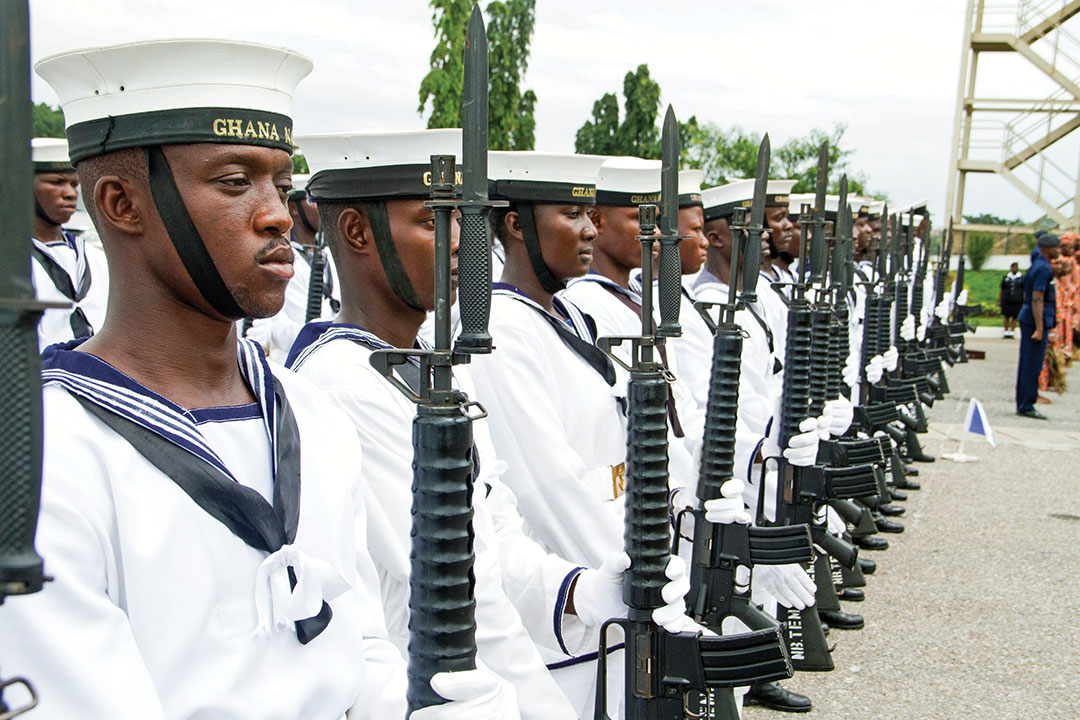
GOVERNMENT OF GHANA
ADF: How would you assess the current security situation in Ghana’s coastal waters?
Rear Adm. Faidoo: The security situation is very good. We do have the electronic means to monitor our waters all the way to the end of the EEZ, and we have, thankfully, sufficient assets, together with assistance from the Air Force maritime patrol aircraft, to be able to know exactly what goes on in our waters at any time. And, when necessary, we go out there and we have arrested several vessels engaged in illegal fishing, trawling, theft and things of that nature.
ADF: You called for new training of Ghana’s Navy to meet new maritime threats. What type of training are you trying to introduce?
Rear Adm. Faidoo: Within Ghana, we work very closely with other agencies to secure the maritime domain. We particularly work very closely with the Ghana Maritime Authority, which has the mandate to coordinate maritime security and safety issues. They are very supportive of us logistically, which has enhanced our capabilities. Going forward we need to complete and promulgate our national strategy for maritime security, which will clearly spell out the responsibilities of each agency and provide mechanisms for coordination. A lot of times when you have illegal activities at sea, you want to be able to go out there and accost those vessels. Sometimes there is a requirement for close boarding or what we call “noncompliant boarding.” In line with this, we have developed Special Boat Squadrons that are trained and equipped to deal with asymmetric threats and law enforcement issues. These special forces can conduct potentially high-intensity operations as well as benign operations in the law enforcement category. They are also trained to work alongside civilian counterparts.
ADF: Does part of this training include the need for Sailors to be aware of maritime law?
Rear Adm. Faidoo: That’s an area we have issues with. Invariably, because we are a Navy and are not equipped to prosecute, what we do in Ghana is once we arrest someone, we have to hand them over to a prosecutor’s service. We do not have sufficient legal knowledge to prosecute. Whenever we go on fisheries patrols, they go along with officers from the Ministry of Fisheries so they will be able to check for infractions and take documentary evidence. Then we hand them over, when we get to shore, to the Attorney General’s Department for them to be prosecuted. So, yes, we do need to have the capacity for legal education, especially in order to understand the nature of the infraction and, more important, to be able to prosecute and set examples for other people to stop that.
ADF: You also have called for more collaboration between the Navy and other government agencies. How do you plan to make this happen?
Rear Adm. Faidoo: We are collaborating very well. All of us are stakeholders in this venture; we have a lot of challenges with respect to resources and frequently call upon the Maritime Authority and Ghana Ports and Harbours Authority to assist us, sometimes with fuel to go to sea, sometime with equipment. The Fisheries Ministry of Ghana, for instance, has purchased two patrol vessels for us, which are run by the Navy. Currently, the Ghana National Petroleum Co. is in the process of negotiating with some of the oil companies so they can assist us to get more patrol vessels for the protection of our oil industry. So, yes, we do collaborate with a whole lot of agencies, and it is very helpful to keep our waters safe.
ADF: How would you describe the current maritime security partnerships between Ghana and other countries in the region?
Rear Adm. Faidoo: With these maritime exercises, it helps us to conduct joint and combined operations. The Gulf of Guinea is made up of French-speaking and English-speaking countries. Until recently with the onset of these exercises, which are generally sponsored by the United States, we did not collaborate so much with each other. But with the support of the U.S. Navy and AFRICOM, we have a lot of collaboration. It has been really helpful, allowing the English-speaking and French-speaking nations to operate together. It has brought down the suspicions and rivalry. Now we all operate together as a joint force. There are areas that are a bit of a challenge. We have different doctrines. Ghana and Nigeria use the British doctrine and American doctrine, while the French-speaking countries’ system is based on the French system. That is an area that we are working hard to try to fix. But the collaboration has enabled us to share information so the bad guys know that they cannot escape from one nation’s waters and go to the next. For instance, if there is a vessel that has committed a crime in Togo and is running into Ghanaian waters, the Togolese authorities will inform us, we will go out there and accost it and hand them over to Togo. We also have a gentleman’s agreement that we can do hot pursuit. If we are chasing a criminal and he arrives in Togolese waters, we merely inform the Togolese and we can go into their waters and make the arrest. It has been very helpful. In Ghana, our government officials and the general population are aware of the importance of keeping a powerful Navy to monitor our fisheries resources, prevent crime at sea and generally keep the sea lines of communication open for business. I think the Gulf of Guinea has an unjustified reputation as a dangerous area. We go out of our way to make it safe for crews and passengers of ships.

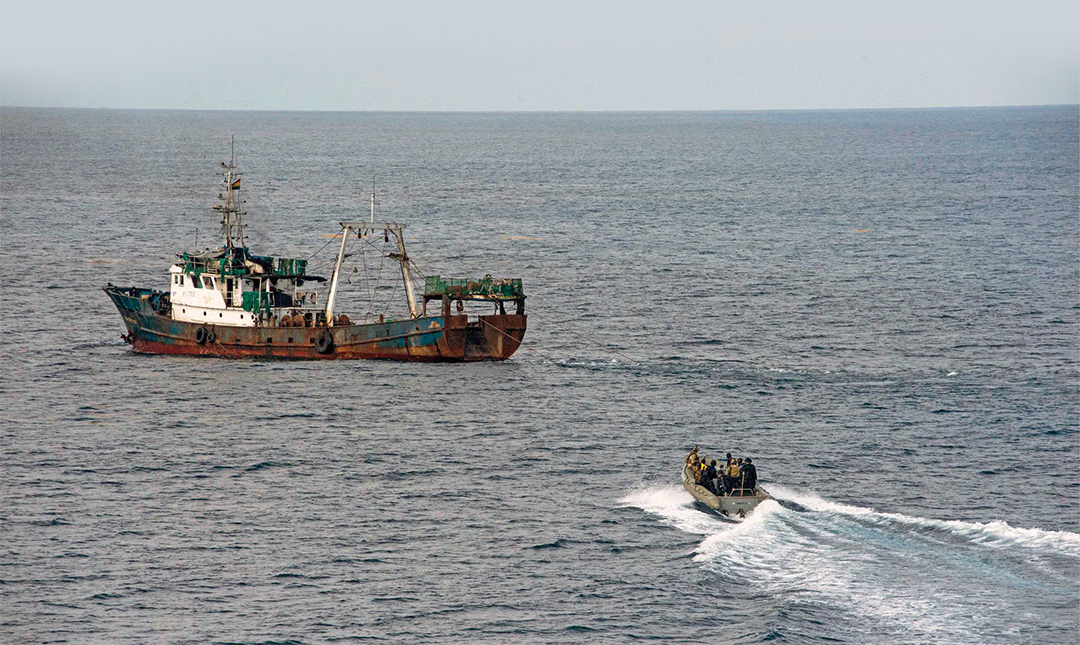
Comments are closed.